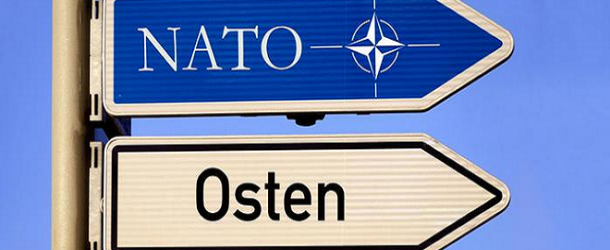For the past 400 years Russia has exercised control of the area of the modern day Ukraine. Recent problems between Russia and Ukraine are not an outcome of animosity among the two nations, but rather the implementation of ”Anaconda Plan” tactics against Russia by the U.S., NATO and European Union. This tactic was first employed by General George Brinton McClellan during the U.S. Civil War (1861-1865). The objective was to block the geopolitical enemy’s access to the seas, oceans, allies and natural resources. Thus, the party capable of implementing it would acquire stronger position and weaken geopolitical posture of the adversary.(1)
It is in various manifestations that the ”Anaconda” tactics have been realized for over 300 years within ”The Great Game” – the struggle that Russia and Britain went through in the XIX century. ”Anaconda” tactic is its founding component. Yet opinions differ on this issue. Eric Walberg for example, considers ”The Great Game” to be the struggle between the hegemonic powers of the world and as such, divides it into three elements”(2):
– A phase from the first half of the XIX until XX centuries when Russia and Britain clashed over the Asian Heartland. Its breaking point was November Revolution in Russia;
– The Cold War phase of the Post-WWII period, when USSR and USA collided and that ended with eventual ”defeat” of the USSR and demise of the Socialist regime;
– A phase that has commenced in 1989 and is ongoing. The world called the ”West” (3) where no big power is capable of running it singlehandedly and the U.S. is aiming to ensure control over energy and natural resources faces ”another world”.
The ”Anaconda” tactics have been used by the West against Russia in the form of the colored revolutions in Yugoslavia (2000), Georgia (2003), Kyrgyzstan (2005) and Ukraine (2004, 2014). These revolutions were aimed at restricting Russia’s geopolitical space and forcing it to lose control in the post-Soviet geography.
After the collapse of the Soviet Union on 21 December 1991 Russian Federation conceded the loss of the Eastern Europe and the Baltic states. However, the situation has changed when the Western world attempted a takeover in the post-soviet geography. When this advantage surfaced within the borders of such geopolitically important nation as Ukraine Russia resisted and confronted the move.
American policy on Russia was influenced by the victory of liberals over the realists in the ideological battle of the 1990s. Although realists welcomed the ensuring of complete control over Europe and the Baltic states, and eastward enlargement of NATO, they disagreed with incursion into the post-Soviet geography.
Realists believed that full membership of Georgia and Ukraine to NATO would agitate already ”aging” and economically feeble Russia and awaken its former hegemony aspirations. One of the representatives of the realist school George Kennan in his analysis of the phase of NATO’s eastward enlargement argued that ”Russians will gradually react quite adversely and it will affect their policies. I think it is a tragic mistake. There was no reason for that whatsoever. No one was threatening anybody else”.(4)
Liberals in the Clinton Administration saw this stage rather as an opportunity and thought it was the best time to secure the dominance in the Eastern Europe and the post-Soviet space, given the fact that being weak, Russia would not show much resistance. Widespread idea among the liberals was that the end of the Cold War signaled fundamental changes in the world politics; that it was not realism but idealism that would prevail in the world and spearheaded by the U.S., it would become a priority subject in the foreign and security agenda of the rest of the world.
At that stage the U.S. and the European Union sought to expand economic and political ties with the Eastern European nations and wished to see these countries within the borders of the European Union. Liberals believed that liberalism could shape Europe regardless of geopolitical realities. But the example of Ukraine demonstrated that geopolitics must not be dismissed. Russia more clearly sensed the threat emanating from this factor and was compelled to take action.
After the dissolution of the Soviet Union U.S., European Union and USSR’s prominent statesmen reached an agreement on stationing of American troops in Europe and preserving of NATO. Russians were hoping that after unification, Germany would pursue more peaceful policy and the Western politicians would understand their concern. Nevertheless, since the mid 1990s the U.S. initiated the NATO’s eastward enlargement and the European Union pushed for expansion towards the Eastern Europe. Analysis of the policies conducted by the U.S. and the European Union towards the post-Soviet space, and especially Russia, reveals three distinctive directions:
– NATO enlargement,
– EU enlargement,
– Broadening and strengthening of democracy.
The first phase of the enlargement came to an end in 1999, with the membership of the Czech Republic, Hungary and Poland. Membership of Bulgaria, Estonia, Latvia, Lithuania, Romania, Slovakia and Slovenia in 2004 brought NATO to the doorstep of the post-Soviet geography. Russia felt this threat even closer with NATO bombing the Serbs in 1995. The next objective of the Western world was to accelerate the NATO membership process for Georgia and Ukraine.
Despite that Russia tried different channels in communicating its uneasiness regarding the European Union and NATO enlargement towards the post-Soviet space and growing prospects of Georgia’s and Ukraine’s membership to NATO, the U.S. and EU failed to take that into account.
Dr. Hatem CABBARLI
References
- Комлева Н.А, Украинский кризис как элемент ”тактики анаконды”, Пространство и Время, 2(16)/2014, http://www.space-time.ru/assets/files/2-16.2014/2226-7271provr-st2-16.2014.13-komleva.pdf.
- Walberg, Eric. Postmodern Imperialism: Geopolitics and the Great Games. Atlanta, GA: Clarity Press, Inc. 2011.
- Панарин А.С. Православная цивилизация в глобальном мире. М.: Алгоритм, 2002.
- Миршаймер Дж., Почему Запад повинен в кризисе на Украине, http://www.globalaffairs.ru/number/Pochmu-Zapad-povinen-v-krizise-na-Ukraine-16921, 3 сентября 2014.



















































